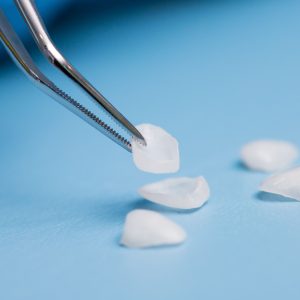Understanding Dental Bonding
Dental bonding is one of the most accessible and minimally invasive cosmetic dentistry procedures available. It involves applying a tooth-colored composite resin material directly to the tooth’s surface to repair chipped or cracked teeth, close small gaps, or mask discoloration.
The dental bonding procedure usually takes just one visit and requires little to no enamel removal, making it an excellent option for patients who prefer a fast, conservative treatment. Dr. Nishime carefully sculpts and polishes the bonding material to blend seamlessly with your natural enamel, restoring a smooth and even appearance.
 Ideal Candidates for Dental Bonding
Ideal Candidates for Dental Bonding
You may be a good candidate for bonding if you have:
- Minor chips or cracks on the edges of your teeth
- Small gaps between teeth
- Slight tooth discoloration that whitening treatments can’t remove
- Irregularly shaped teeth or subtle imperfections
Bonding is also ideal for those looking to improve their smile without committing to permanent veneers or more invasive dental procedures.
Understanding Porcelain Veneers
Porcelain veneers are thin, custom made shells designed to fit over the front surface of your natural teeth. Made from high-quality porcelain, they provide a durable, stain-resistant, and incredibly lifelike enhancement that can correct severe discoloration, misshapen teeth, chips, and minor alignment issues.
Each veneer is crafted in a professional dental lab to match your unique smile aesthetics—color, shape, and translucency. While veneers require slight enamel removal, this step ensures a natural, long-lasting fit.
Ideal Candidates for Porcelain Veneers
You may benefit from porcelain dental veneers if you:
- Have severe discoloration that whitening can’t fix
- Want to correct misshapen or worn teeth
- Have multiple cosmetic imperfections
- Desire a complete, long-lasting smile makeover
At Advanced Restorative Dentistry, Dr. Nishime uses only the finest thin porcelain shells, ensuring a natural appearance and superior comfort. His artistry and precision help patients achieve a confident smile that feels as authentic as it looks.
Porcelain Veneers vs. Dental Bonding: Key Differences
While both treatments enhance your smile, they differ in several key ways. Understanding the distinctions can help you decide which cosmetic solution best aligns with your goals.
1. Materials Used
- Dental bonding uses composite resin, a pliable, tooth-colored material applied and hardened with a special curing light.
- Porcelain veneers are made from ultra-durable porcelain crafted in a dental lab, offering a more natural luster and stain resistance.
2. Procedure and Tooth Preparation
- Bonding is quick, typically completed in one appointment, and often requires no enamel removal.
- Veneers involve minimal tooth preparation, as a thin layer of enamel is removed to ensure a perfect fit. Temporary veneers may be placed while your custom ones are being fabricated.
3. Appearance and Finish
Porcelain mimics natural tooth enamel better than composite resin, creating a more realistic shine and translucency. Bonding looks beautiful but can appear slightly more opaque.
4. Durability and Longevity
- Bonding typically lasts 5 to 7 years with proper care.
- Porcelain veneers can last 10 to 15 years or more, resisting stains from coffee, red wine, and tea.
5. Cost and Investment
- Dental bonding is more affordable upfront, making it a great option for minor repairs or single-tooth treatments.
- Porcelain veneers cost more per tooth but offer a longer lifespan and greater resistance to stains and wear, providing better long-term value.
6. Maintenance and Care
Both options require good oral health and routine hygiene:
- Brush and floss regularly
- Schedule regular dental checkups
- Avoid biting hard objects or chewing ice
- Limit staining beverages to maintain brightness
Choosing Between Veneers and Bonding
Your decision between porcelain veneers vs. bonding depends on your dental needs, cosmetic goals, and long-term expectations.
- Choose dental bonding if you want a cost-effective, fast, and minimally invasive fix for minor cosmetic blemishes.
- Choose porcelain veneers if you’re seeking a durable, transformative solution for multiple teeth or more complex cosmetic issues.
During your consultation at Advanced Restorative Dentistry, Dr. Nishime will carefully evaluate your tooth enamel, gum health, and overall oral health. Using advanced imaging and smile design software, he’ll help you visualize how each treatment could improve your smile.
Combining Treatments for the Best Results
In some cases, patients may benefit from both dental bonding and veneers. For instance, bonding can repair small imperfections or protect exposed tooth roots, while veneers can address the front teeth for a cohesive, uniform smile.
This customized approach allows Dr. Nishime to address both functional and aesthetic needs, achieving balanced results that feel natural and look beautiful.
The Advanced Restorative Dentistry Advantage
When you choose Advanced Restorative Dentistry, you’re placing your smile in the hands of one of Honolulu’s most respected dentists. Dr. Michael Nishime brings over 30 years of experience in cosmetic and restorative dentistry, known for his gentle touch, precision, and commitment to quality.
He has earned fellowships from organizations such as the Academy of General Dentistry, American Academy of Implant Dentistry, and the American College of Dentists. Together with his skilled team—including Sayoko Kendall (Treatment Coordinator), Naomi Kimura (Dental Assistant), Mie Choe (Dental Hygienist), and Chie Young (Office Manager)—Dr. Nishime ensures that every detail of your treatment is tailored to you.
Whether you choose composite bonding or porcelain veneers, you’ll receive personalized care designed to enhance your smile’s beauty and your long-term oral health.
Frequently Asked Questions
On average, porcelain veneers cost between $1,500 and $2,500 per tooth, while composite veneers range from $800 to $1,500. The final cost depends on the dentist’s expertise, the number of teeth treated, and whether additional procedures are required.
Yes, veneers are considered a worthwhile investment because they provide a dream smile that can last 10–15 years with proper care. Unlike other cosmetic dental procedures, veneers address multiple imperfections at once, saving money long-term.
Most dental insurance plans don’t cover veneers since they are an elective cosmetic procedure. However, if veneers are recommended to restore damaged teeth, partial coverage may be available. Our team offers payment plans and financing options to make treatment affordable.
Restore and Redefine Your Smile in Honolulu, HI
Whether you choose porcelain veneers or dental bonding, Dr. Michael Nishime and his team at Advanced Restorative Dentistry are here to help you achieve a beautiful smile that enhances your confidence and health.
Call our cosmetic dental team in Honolulu at (808) 732-0291 today to schedule your consultation and discover which treatment—bonding vs. veneers—is the best match for your unique smile goals.

 Ideal Candidates for Dental Bonding
Ideal Candidates for Dental Bonding
